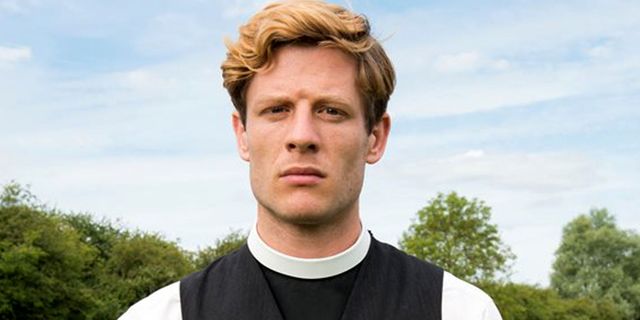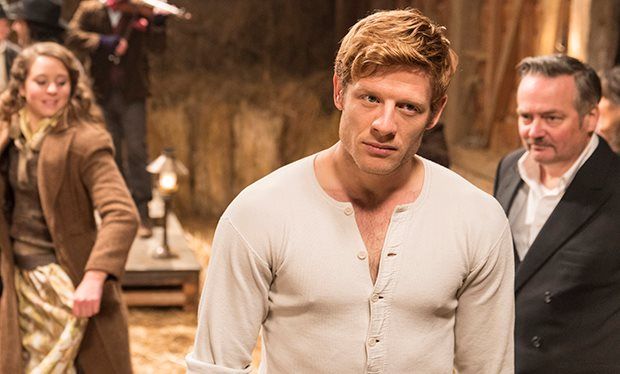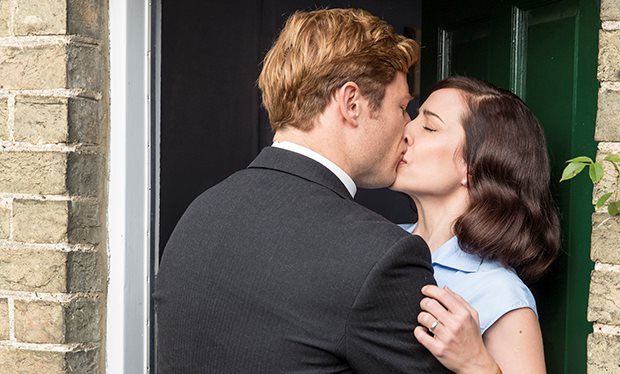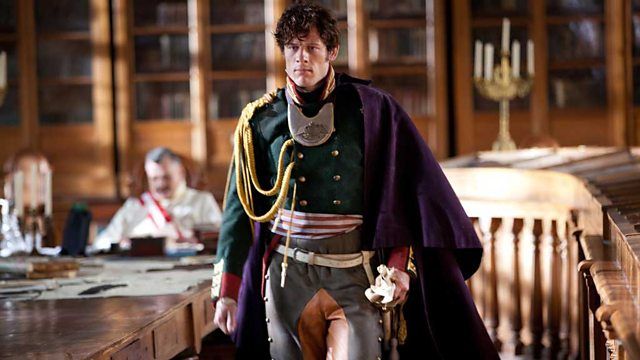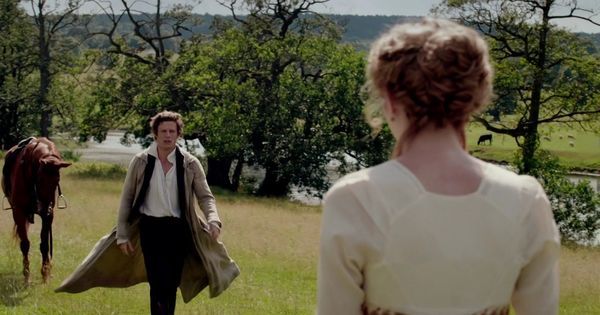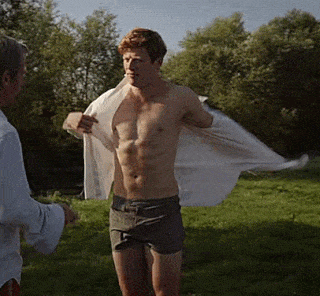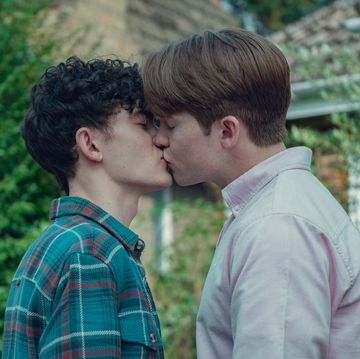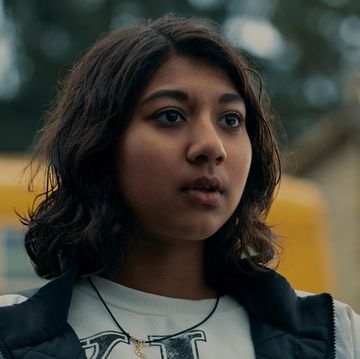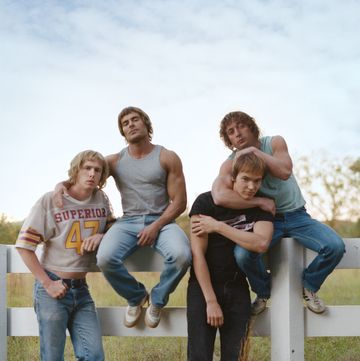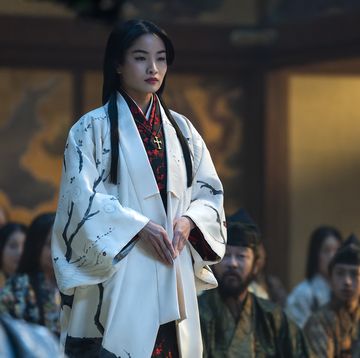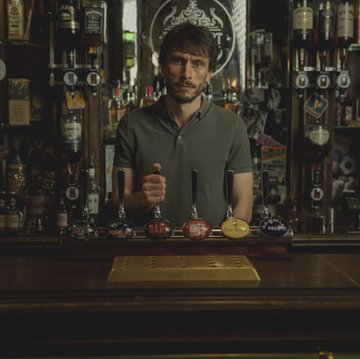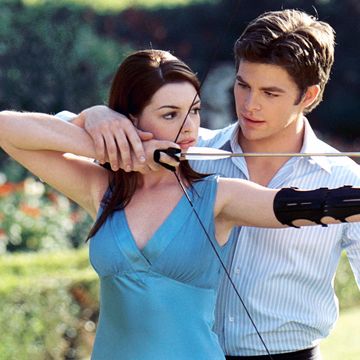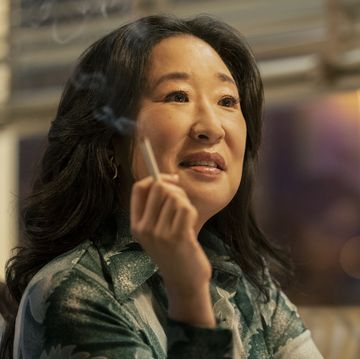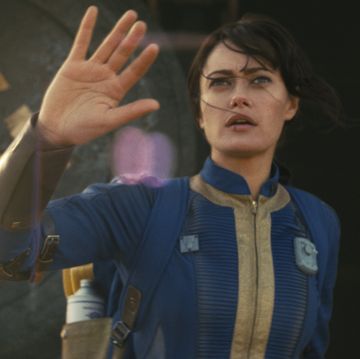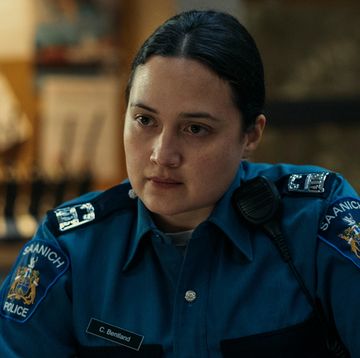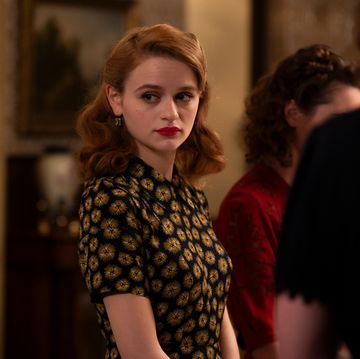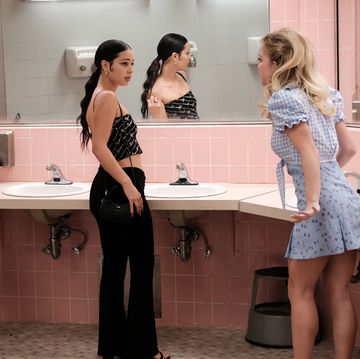No disrespect to Jude Law, but he isn't the hottest man of the cloth to grace our TV screens this year. The divinely sexy James Norton has been blessing our Sunday nights playing vicar Sidney Chambers on Grantchester this season—and he takes the hot clergyman cake.
In addition to his day job solving murders and preaching sermons on Grantchester, you might recognize Norton from his roles in Happy Valley, War and Peace, and Death Comes to Pemberley. With his period good looks, the actor doesn't want to get pigeonholed as an old-fashioned heartthrob, but as the complicated Sidney, Norton delivers the kind of drama we still love today.
On Sunday night's penultimate episode, Sidney was presented with an ultimatum by Amanda (Morven Christie), the divorced woman he's loved―and whom we've been rooting for―since the star-crossed lovers first met. "It's me or the church," she tells him, before closing the door in his face.
"People ask me what I would choose, and I would hate to be in that situation," Norton tells me over the phone. "Poor Sidney." Here, the actor talks Grantchester drama, adoring fans, and how he really feels about taking his shirt off.
First off, I'll just tell you, I texted my mother telling her I was going to talk to you, and she responded, "OMG." She's a very big fan.
I love your mum. It's so funny—when I'm walking around, whoever comes up to me, whatever age they are, they always say, "My mum absolutely loves you." I owe my career to the mums.
That's not a bad thing! What do you get recognized for the most?
It's a mixture. Grantchester is the most far-reaching. I've been to some weird places in the world and I didn't really appreciate how much and how well it sold in Canada. I'm on the Saint Lawrence River, and this lady in a canoe is like "OH MY GOD! You're the vicar!" In the UK, the young people will have watched Happy Valley and a little bit of War and Peace. Everyone always asks me, "Oh, is it really tiring [being recognized]?" Most people are really polite and lovely. But it actually happens so seldom, and also everyone's so charming and lovely about it. It's actually fine! People are quietly coming up to you saying, "Love the work." Great! That's very kind.
Have you ever had any crazy fan reactions?
Occasionally. I'm not very good at social media. I don't really—I occasionally get sort of quite [crazy mentions], which you have to take with a pinch of salt. When Happy Valley came out, I remember some people losing the line between reality and the arc of the story. I can think of an instance where one woman was standing behind me and I turned around and she saw my face and just let out this horrible scream. But generally I've avoided the mad crazy fans. The Grantchester fans particularly are so loyal and love the show so much. Sidney and all those characters—they're so personable and so beautifully drawn, so I think people really feel a great affection and warmth towards the show and them.
The second to last episode just aired in the US, and it ended in this very dramatic moment where Amanda says to Sidney, "It's me or the church."
Yeah, she spells out the final ultimatum. In the series, the central tenet is love vs. duty. Sidney loves a good conflict. He loves to wrangle it and sort of crash into an existential crisis. There's nothing bigger for him, really. As he says, if God is love and the person he loves is Amanda, then why should his duty to the church preclude him from that relationship? What [Grantchester writer] Daisy Coulam does so beautifully is set up these conundrums, these uneasy ethical debates, and there's no answer to them. They are the ultimate star-crossed lovers because the time dictates that he's gonna do his job, and he's not able to marry a divorced woman. But he's a young, passionate, hot-blooded man, a romantic man, who is deeply in love with one person and has been for years. And yet he loves God and he has made this vow to serve God.
It's a gift for an actor because it's that wonderful sort of gray, messy area. Good drama is all about the middle ground, and that's what Grantchester nails beautifully. People who watch the series, their reactions are divided. Some people felt like he should choose the church, and some people felt like he should choose Amanda. It really was a testament to how cleverly drawn that central conundrum was. People ask me what I would choose, and I think I would hate to be in that situation—poor Sidney. But it was a really rewarding headspace to explore for an actor. It was really exciting to play with.
The show also tackles some interesting themes, like the tension between homosexuality and faith at that time―after Leonard tries to commit suicide, Sidney comforts him, saying, "You are who you are, you can't fight who you are."
I love that. I love the fact that it's so much more than just a procedural. We've got these incredible characters like Leonard, and not only do we have a murder mystery, which now comes second to the overarching narrative and the characters' journeys, but also [Daisy Coulam] manages to weave in these topical and poignant debates of the time. This, as you said, or how the last season dealt with the death sentence and issues of race and racial equality. Without being sanctimonious or preachy, it's just really thought-provoking. I love those scenes of Leonard's. They're two men who are born into the wrong era. There's a moment in the last episode—Leonard finds his voice and that storyline evolves. Obviously, I won't tell you what happens. You can look forward to that.
So what is next for you?
We just finished filming McMafia, a new AMC/BBC co-production, which is very different from anything I've filmed before. It's an eight-part, big-budget exploration of the modern-day mafia and the globalization of organized crime. Without really realizing, Hossein Amini, who wrote Drive, and James Watkins, who is the creator and director, managed to create the most zeitgeisty show possible. With everything that's going on with Trump and his son, and Jeff Sessions and James Comey, everyone speculates about what corruption looks like. This show is also a little glimpse behind the curtain at financial corruption. It's a really good, Godfather: Part 2–type story about a man who gets sucked into the mafia, and I'm very lucky to play that role. I've got some press to do for Flatliners, which is coming out in September. And then I have time off and a bit of breathing space to find the next job. I don't know what it will be, but I'll keep you posted.
These projects and 'Happy Valley' sound different than the period dramas you're known for: 'Grantchester,' 'War and Peace,' and 'Death Comes to Pemberley.' Do you think you have a period drama look?
Well, I think every actor runs the risk of falling into one of those pigeonholes. I was so lucky with Happy Valley, because most actors go into a job because they're inquisitive, they want to learn about the world. And a great way of doing that is to put yourself in different headspaces and worlds and periods. If you just do the same world and the same role, then it becomes less of that. Some people like that, and they choose that stability and know what they're good at. But the chance to transform is the most exciting thing. So I was really lucky when the people at Red [Production Company] took a punt on me for Happy Valley, because it allowed me the opportunity to go on a huge transformative journey.
I went to good schools and I sound sort of London, I think, and the way I look can be seen as period, but Happy Valley was such a detour from that, and now people are more willing to entrust me with slightly different roles. For example, the McMafia role is definitely similar, this man who carries a real darkness. I would hate to be put in a rut. The plan is always to complement the last job with something completely different.
I read in one of your interviews that you support male objectification. Is that correct?
It was slightly taken out of context. I don't support male objectification at all, but it often comes up in conversation—how you feel about taking your clothes off in a scene. And all I was saying was that you can get on your high horse and fight it, because sometimes there are scenes like that with no story in them. Or there can be two prongs to the scene—one that sparks story, and the other providing something more titillating. For me, as long as it predominantly serves story, then I don't really mind. All I was saying was that we've spent so long fighting against women being objectified, so it's about time men had to do a little bit of that as well. As long as it doesn't divert from the story and compromise the credibility of a project, then it's fine. It's done in good nature.
But I generally don't really search for the kind of meathead roles. Sidney is the least meatheady—he's a vicar who drinks too much and smokes too much, he's not a gym buff. I took my clothes off at the beginning of an episode and the papers love to run that story. You know it's gonna happen, but it's fine. You can get on your high horse, but it doesn't matter because you've probably got a little bit less of a right to get on that high horse.
You can give the people what they want as long as it makes sense in the story.
Totally. Exactly. And it's fun in a way, and I have very little right to be shouting in comparison to some of my female colleagues and counterparts who have had to deal with it over the years.
Is there any role that you haven't done yet or would love to tackle?
I haven't done much theater in the last four years and I really would love to go back on stage―my training at drama school was very classical, very theatrical. I did loads and loads of Shakespeare in drama school and I've not done a single bit since leaving, so I would love to do a bit of Shakespeare. I know it's massive, but I'd love to do Hamlet just to see if I can. I think that's the ultimate challenge and best sort of storytelling there is. I don't know if I have roles that I have a burning desire to play. But there are a lot of fascinating individuals out there and I get given these amazing opportunities, so I'll wait and see.
This interview has been condensed and edited.
